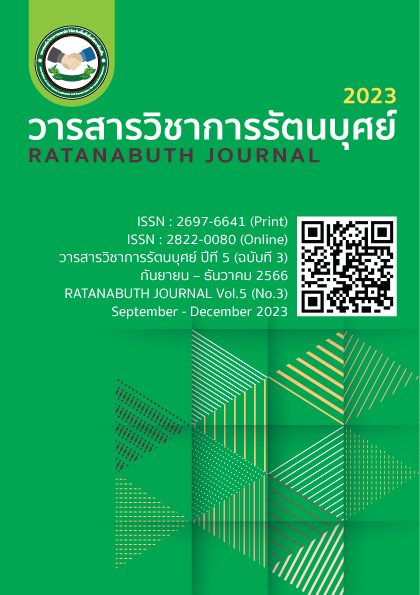Success Factors for Educational Institution Management of Educational Personnel Special Education Center, Educational Area 11, Nakhon Ratchasima Province Success Factors for Educational Institution Management of Educational Personnel Special Education Center, Educational Area 11, Nakhon Ratchasima Province
Main Article Content
Abstract
This research aims to 1) Study the level of success factors 2) to study the level of school management factors and 3) to study the relationship of success factors to school management of educational personnel at the Special Education Center, Educational Area 11, Nakhon Ratchasima Province. The population used in this research was 165 educational personnel. The tool used was a questionnaire. The statistics used to analyze the data were frequency distribution Determination of percentage, mean, standard deviation and Pearson's Product Moment Correlation Coefficient analysis.
The research results found that: 1) Overall success factors at a high level When considering each aspect, it was found that the first rank was external factors, followed by internal factors.1.1) External factors as a whole are at a high level. When considering each finding, it was found that the number 1 ranking was the external environment, followed by the characteristics of the service recipient. And finally, the characteristics of those involved.1.2) Internal factors, overall, are at a very high level. When considering each aspect, it was found that number 1 was personnel quality. Followed by resources, goals, and policy and practice. Organizational structure and the last ranking is organizational culture. 2) Management of educational institutions Overall, the average is at a moderate level. When considering each aspect, it was found that number 1 was the curriculum and process. Next is the focus on personnel. Focusing on students’ Organizational leadership and organizational governance and the last ranking is financial aspects and service performance.3) Results of the analysis of the relationship between success factors and educational institution management. Using the multiple regression method, it was found that external factors and internal factors gave a multiple correlation coefficient (R) equal to 0.912 and can explain the variation in success factors affecting educational institution management. Statistically significant at the 0.01 level was 80.00 percent (R2=0.800). And the results of the test results of the hypotheses on success factors for educational institution management found that every hypothesis was consistent and found that statistically significant at the 0.01 level.
Article Details

This work is licensed under a Creative Commons Attribution-NonCommercial-NoDerivatives 4.0 International License.
References
จีระพรรณ โพนพุธ.(2560). ปัจจัยที่ส่งผลต่อประสิทธิผลของศูนย์การศึกษาพิเศษภาคตะวันออก.ปริญญาโท คณะศึกษาศาสตร์.ชลบุรี:มหาวิทยาลัยบูรพา.
ในตะวัน กำหอม.(2559).การวิจัยทางการศึกษา.เล่ม 1.มหาสารคาม: โรงพิมพ์ทีคอม.
พรรณวดี ปามุทา.(2559). ปัจจัยความสำเร็จในการบริหารจัดการโรงเรียนมาตรฐานสากล ระดับประถมศึกษา สังกัดสำนักงานคณะกรรมการการศึกษาขั้นพื้นฐาน. วิทยานิพนธ์ปรัชญาดุษฎีบัณฑิต. กรุงเทพฯ: บัณฑิตวิทยาลัย มหาวิทยาลัยสยาม.
ภัครมัย เดียสะ.(2560). การบริหารจัดการเรียนร่วมโรงเรียนขยายโอกาส เครือกะเปอร์พัฒน์ เพื่อศึกษาสภาพการบริหารจัดการเรียนร่วมและเพื่อเสนอแนวทางการพัฒนาการบริหารจัดการเรียน ร่วมโรงเรียนขยายโอกาสเครือกะเปอร์พัฒน์.สาขาการบริหารการศึกษา.กรุงเทพฯ: มหาวิทยาลัยราชภัฏสวนสุนันทา.
เรืองสิทธิ์ นามกอง.(2560). การประเมินความต้องการจำเป็นในการใช้ทรัพยากรทางการบริหารเพื่อการจัด การศึกษาแบบเรียนรวมของโรงเรียนในสังกัดสำนักงานเขตพื้นที่การศึกษามัธยมศึกษา เขต 25.วารสารศึกษาศาสตร์ ฉบับวิจัยบัณฑิตศึกษา มหาวิทยาลัยขอนแก่น, 11,(4), 142-153.
วิจิตรา กูลหกูล.(2560). ปัจจัยที่ส่งผลต่อความเป็นเลิศของโรงเรียนมาตรฐานสากล สังกัดสํานักงานเขตพื้นที่การศึกษ มัธยมศึกษา เขต 2.วารสารบริหารการศึกษา มศว,14(27): 79-87.
ศูนย์การศึกษาพิเศษ เขตการศึกษา 11.(2565). รายงานผลการประเมินตนเองศูนย์การศึกษาพิเศษ เขตการศึกษา 11 จังหวัดนครราชสีมา สังกัดสำนักบริหารการศึกษาพิเศษ. กรุงเทพฯ:สำนักงานคณะกรรมการการศึกษาขั้นพื้นฐานกระทรวงศึกษาธิการ.
อุมาพร สันตจิตร.(2552). ปัจจัยที่สัมพันธ์กับความสําเร็จในการบริหารสถานศึกษาเอกชน ระดับประถมวัยในจังหวัดนครศรีธรรมราช. วิทยานิพนธ์ครุศาสตรมหาบัณฑิต สาขาวิชาการบริหารการศึกษา บัณฑิตวิทยาลัย.นครศรีธรรมราช: มหาวิทยาลัยราชภัฏนครศรีธรรมราช.
Bibi, A., Khalid, M. A., & Hussain, A. (2019). Perceived organizational support and organizational commitment among special education teachers in Pakistan. International Journal of Educational Management, 33(5), pp. 848-859.
Kijai Jimy. (1987). School Effectiveness Characteristics and School Incentive Reward. Dissertation Abstracts International.48(04), 314 – A.
Reid, Ken,Hopkins, David and Holly,Peter.(1988).Toward the Effective School. Oxford: Basic Blackwell Ltd.
Ruhl, M.L. (1985). The Development of a Servey of School Effectiveness Climate, Principal Leadership. Dissertation Abstracts International. 46(11): 3216-A.


